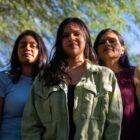
A campus shooting spurred her political awakening. Her whole family followed.
|
TUCSON, Arizona — Adriana Grijalva was getting ready to head to class at the University of Arizona in the fall of 2022 when she got a text message from her cousin telling her to stay put. The cousin, who works in maintenance at the university, had watched law enforcement descend on campus and reached out to make sure she was safe. A former student had just shot a professor 11 times, killing him.